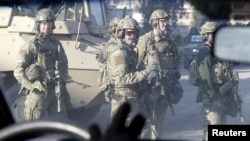When Iraqi forces faced a fierce Islamic State counter-attack last month at a hospital in Mosul they had stormed without enough troops to hold it, U.S. advisers behind the front lines shepherded them to safety.
And as they punched through the city's northern limits a few weeks later, it was again the Americans who counseled them how best to avoid roadside bombs and head off Islamic State suicide car bombers.
Washington, leading an international coalition against the jihadists in Iraq and Syria, has launched thousands of airstrikes over the past 2-1/2 years and provided aerial surveillance vital to pushing them back.
But American guidance to Iraqi counterparts all the way up to the commander-in-chief has taken on greater significance in the Mosul campaign, which entered its fourth month this week, as advisers integrated with the Iraqis to an unprecedented level for conventional U.S. forces.
As the Iraqis have made rapid gains in a renewed push since the turn of the year, retaking nearly all of eastern Mosul, U.S. soldiers have moved closer to the fight.
The coalition insists that on the battlefield the Iraqis "own the plan." But Iraqi commanders say the Americans' advice, like their firepower, has become indispensable.
Lieutenant Colonel Salah Kareem al-Kinani, from the 9th armored division which briefly seized the Salam Hospital in December, said his troops were surrounded, running out of ammunition and moments away from disaster when the United States launched airstrikes that provided a "lifeboat". The help didn't end there.
"The Americans were instructing us on the routes we should take to retreat and avoid Daesh ambushes," he said by phone, using an Arabic acronym for Islamic State.
"Without them, we would have been blind on the ground."
Colonel Ahmed al-Taie from the 16th army division fighting around northern Mosul estimates U.S. support is responsible for half of all battlefield gains.
"Without the Americans' support, it would have been tough to reverse the tide against Daesh in Iraq," he said.
When Iraqi commanders from all the Mosul fronts met in December to break deadlock on the battlefield, the Americans were on hand to lend advice.
Combined operations
Lieutenant Colonel Ed Matthaidess says his most productive work as an adviser is done each night after the guns fall silent and he sits with his Iraqi counterparts.
Over countless cups of sugary black tea, the officers pore over maps and data, discussing what went right and wrong that day and how to adjust strategy.
Reuters gained unprecedented access late last month to three locations where hundreds of U.S. troops are deployed, including one of their most forward outposts in Bartella where Matthaidess operates.
His team occupies a two-story house about 10 km (6 miles) east of Mosul where officers from both militaries congregate around large screens glowing with color-coded maps of the battlefield and live drone feeds.
"Anything that you could imagine goes into the fight [has] at some point and time ... been advised on," Matthaidess told Reuters.
That often means revising Iraqi plans to maximize the effectiveness of coalition firepower as well as enhancing the Iraqis' logistics, intelligence and force positioning.
U.S. soldiers also confer with Iraqi commanders in Mosul to oversee operations and help call in air strikes to a constellation of war rooms across the country where other advisers help the Iraqis decide how to prioritize targets and which aircraft to use.
"The man on the ground knows what's going on best," said Lieutenant Colonel Stuart James, who commands U.S. troops from a separate outpost near Bartella.
"I don't hear the battle, I don't sense the battle. When I have somebody forward on the ground, they can do that."
The Americans reject the notion that they simply tell the Iraqis what to do.
"That's entirely wrong," said Matthaidess. "It's us helping them enable their plan - make it the best that we can".
Though U.S. troops shell Islamic State positions daily and have occasionally exchanged gunfire with them, Washington insists this is not a combat mission.
"Kicking down doors is not contributing to the fight because [the Iraqis] have guys that can do that," Matthaidess said.
As a result, only three U.S. servicemen have been killed since mid-2014 compared with the more than 4,000 U.S. fatalities following the 2003 invasion.
Smaller footprint
The U.S. presence is a far cry from that nine-year occupation which at its height saw 170,000 troops in Iraq.
There are now about 5,260 troops in the country plus around 100 special operations forces who also advise some units and conduct secret raids against Islamic State leaders.
U.S. forces returned to Iraq in 2014 after Islamic State blitzed across the country's north and west, threatening to overrun Baghdad and the Kurdish city of Erbil.
The Americans were initially confined to a few secure bases, but as the militants were pushed back they began venturing out and now appear frequently in heavily armored vehicles.
Victory in Mosul would probably spell the end of Islamic State's self-styled caliphate, but the group is already giving a taste of the tactics it is likely to adopt if it loses its largest urban stronghold.
Scores of people have been killed in bombings in Baghdad in recent weeks, and insurgents have attacked police stations and checkpoints, and cut roads in other areas.
Coalition head Lieutenant-General Steve Townsend told Reuters last month that a "sustained presence" would be needed to keep an Islamic State successor from taking over.





